

Leadership Articles. Blogs featuring Instructional Design & Technology. Experience e-Learning is a blog written by Christy Tucker who is “an instructional designer developing online learning”.
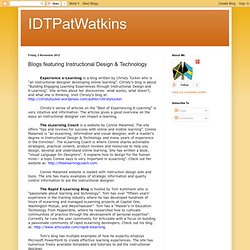
Christy's blog is about “Building Engaging Learning Experiences through Instructional Design and E-Learning”. She writes about her discoveries: what works, what doesn’t, and what she is thinking. Visit Christy’s blog at: Christy’s series of articles on the “Best of Experiencing E-Learning” is very intuitive and informative. The articles gives a good overview on the ways an instructional designer can impact e-learning. The eLearning Coach is a website by Connie Malamed.
Lisa D's Instructional Design Blog. Joe Kaus's IDT Blog. Bruce's Blog. Instructional Design. Anna's Adventures in Instructional Design. Rósa's blog on Learning Theories. Beginning an educational journey as an Instructional Designer. This WordPress.com site is the cat’s pajamas. A great WordPress.com site. Angee's Instructional Designing Thoughts. The Instructional Designer World.
Blog Assignment #1. Site 1: www.teachersfirst.com This amazing site is a free resource site offered to teachers to assist them with reaching out to parents and community members.
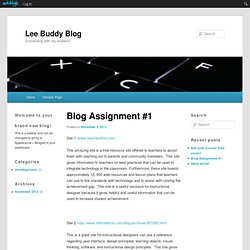
This site gives information to teachers on best practices that can be used to integrate technology in the classroom. Furthermore, these site boasts approximately 12, 000 web resources and lesson plans that teachers can use to link standards with technology and to assist with closing the achievement gap. 3 article review and critique. Live, Love, LEARN! IDLoger. Lblutman. New. Instructional Design. Tiara's Blog For EDUC 6115. Social Constructivism.
Beaumie Kim The University of Georgia Review of Social Constructivism Social Constructivism Vignette Vignette By Roy Jackson, Jessica Karp, Ellen Patrick, Amanda Thrower (2006) Mrs.
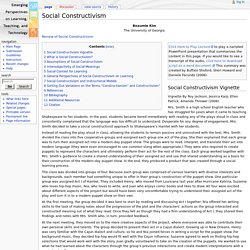
Smith is a high school English teacher who has struggled for years when it came to teaching Shakespeare to her students. Instead of reading the play aloud in class, allowing the students to remain passive and uninvolved with the text, Mrs. The class was divided into groups of four. At the first meeting, the group decided it was best to start by reading and discussing Act I together; Nia offered her writing skills to the task of making notes about the progression of the plot and the characters’ actions as the group interacted and constructed meaning out of what they read. At the next meeting, they moved on to the more creative aspects of the project, where everyone was able to contribute their own personal skills and talents. Behaviorism. From Emerging Perspectives on Learning, Teaching and Technology Melissa Standridge Department of Educational Psychology and Instructional Technology, University of Georgia.
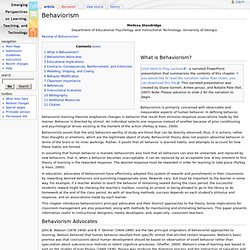
A case study in situated cognition. From Emerging Perspectives on Learning, Teaching and Technology D.
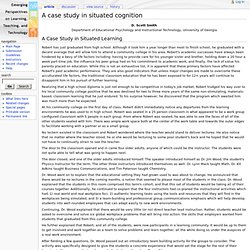
Scott Smith Department of Educational Psychology and Instructional Technology, University of Georgia Robert has just graduated from high school. Although it took him a year longer than most to finish school, he graduated with a decent average that will allow him to attend a community college in his area. Robert's academic successes have always been hindered by a bevy of life factors including: having to provide care for his younger sister and brother, holding down a 20 hour a week part-time job, the influence his peer group had on his commitment to academic work, and finally, the lack of value his parents placed on education.
Realizing that a high school diploma is just not enough to be competitive in today's job market, Robert trudged his way over to his local community college positive that he was destined for two to three more years of the same non-stimulating, materials-based, classroom learning that he just endured. Tec_timeline. Out and About: Discussion on Educational Schools of Thought. Playing with the Definition of “Game Thinking” for Instructional Designers Soon I will be presenting at the ASTD International Conference in Washington, DC.
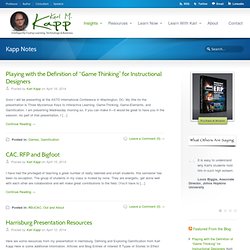
My title for the presentation is Three Mysterious Keys to Interactive Learning: Game-Thinking, Game-Elements, and Gamification. I am presenting Wednesday morning so, if you can make it—it would be great to have you in the session. As part of that presentation, I […] Continue Reading → CAC, RFP and Bigfoot I have had the privileged of teaching a great number of really talented and smart students, this semester has been no exception. Continue Reading → Harrisburg Presentation Resources Here are some resources from my presentation in Harrisburg. Continue Reading → 2014 DOE Symposium Conference Resources Here are my resources for the 2014 DOE Symposium Conference. _isms as filter, not blinker. Learning theory, like politics, is full of _isms: constructivism, behaviourism, cognitivism and now a new one, connectivism.

What should we do about these _isms? Are they a useful guide to what to think and do? In October I wrote this on the home page of the learning evolves wiki: Learning theories might help deliver radical curriculum reform. I think that’s why we have all those -isms (constructivism, behaviourism, connectivism, etc.) and that although -isms can be dangerous we still have them and they might be necessary. What I have noticed is that these _isms do not stand still. That premable helps explain my responses to some recent blogs by Stephen Downes which has become a dialogue between him and Karl Kapp about learning theories. ... it remains puzzling that so much of the instructional design community remains rooted in behaviorism - this more than 30 years after the theory was abandoned everywhere else- Definitions: ABCD Objectives.
Learning theory - models, product and process. Photo by Antenna on Unsplash Contents: introduction · what do people think learning is?
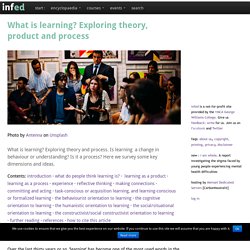
· learning as a product · learning as a process · experience · reflective thinking · making connections · committing and acting · task-conscious or acquisition learning, and learning-conscious or formalized learning · the behaviourist orientation to learning · the cognitive orientation to learning · the humanistic orientation to learning · the social/situational orientation to learning · the constructivist/social constructivist orientation to learning · further reading · references · how to cite this article See, also, What is education?